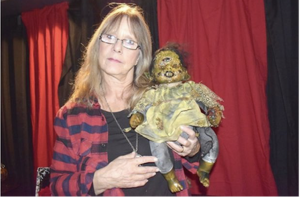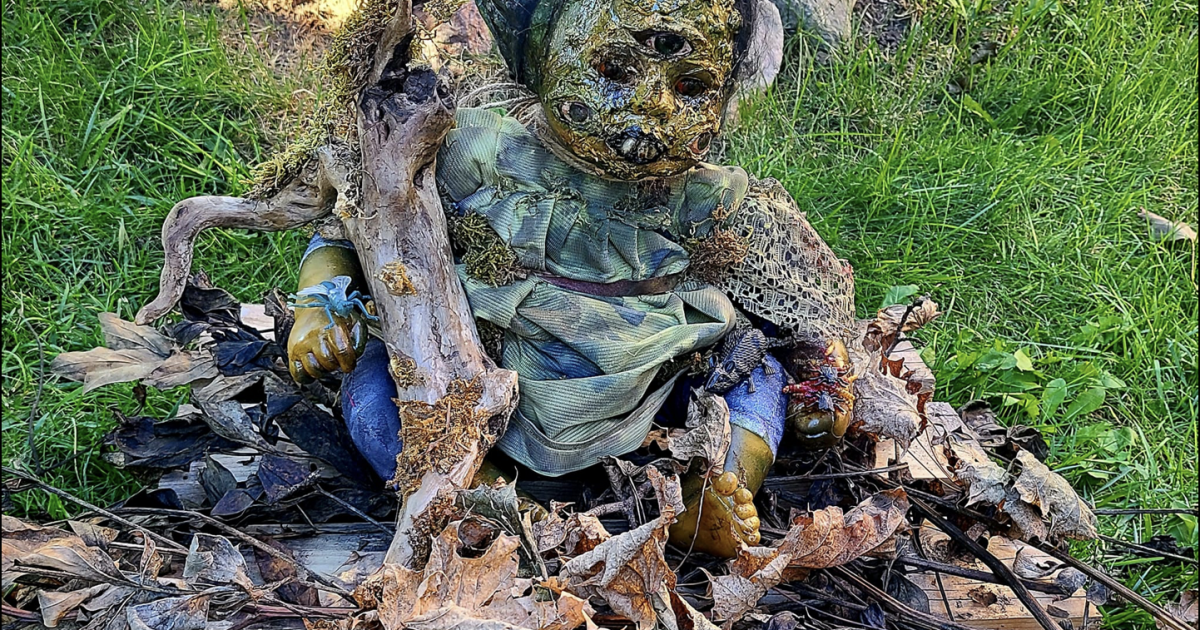Using Art To Express Emotions After a Cancer Diagnosis
- Victoria Potter, who was diagnosed with cancer in 2017, turned to an interesting art form of making dolls as a way to cope with her diagnosis and express her feelings.
- Many cancer survivors turning to art while in recovery. Hospitals around the world are actually making changes to help patients make use of the amazing healing power of art during recovery time.
- SurvivorNet understands the importance of mental health and has significant resources dedicated to mental health for you.
"Art has always been my therapy. I still wanted to create something and get out the frustration I felt because of the diagnosis," Potter told BarrieToday, in an interview.
Read More "I got more than angry and hurt, not knowing what the future would be. So I decided to do a creepy doll to kind of take my feelings out on the doll, and I just posted it to my Facebook wall. And then few people liked it. And then a lot of people liked it, and then I saw people sharing it and asked me how much it was,” said Potter in a separate interview with Simcoe.com.
"I got more than angry and hurt, not knowing what the future would be. So I decided to do a creepy doll to kind of take my feelings out on the doll, and I just posted it to my Facebook wall. And then few people liked it. And then a lot of people liked it, and then I saw people sharing it and asked me how much it was,” said Potter in a separate interview with Simcoe.com.She was diagnosed in August of that year and began posting images of her creations on her Facebook page and soon after started to get inquiries about if they were available for purchase. She says she was sold out of dolls by that Halloween and now has to start working on her pieces by June in order to meet demand.
"I mean, I really love doing that creepy stuff. And like I do all different kinds of art, but this seems to be my niche now. And you know, when people love it, you feel more valued as a person, whether they buy it or not, or they just admire it. It’s something huge, right?,” said Potter.
Potter says she finished monthly rounds of chemotherapy for lymphatic cancer late last year and is now only needing to go for treatment once every three months. She plans to continue her artwork through her treatment and keeps her Facebook page, Creep You Da Funk Out, well stocked with photos of her most recent work.
"It’s been a lifeline to me, and it gave me a sense of value back and thinking that life isn’t over just because you’re unhealthy. Because there’s always something else you can do. And I started thinking more positively, and the creepy stuff is working for me. So I’m pretty happy," said Potter.
Using Art To Cope
Potter is one of a number of cancer survivors turning to art while in recovery. Hospitals around the world are actually making changes to help patients make use of the amazing healing power of art during recovery time. A 2017 study, which appeared in the International Journal of Qualitative Studies in Health and Well-being, found that just putting art on the walls in hospitals could have a pretty dramatic effect on how patients are feeling. Study co-author Michael Mullens told ArtNet that art can reduce the experience of pain through distracting a patient's attention.
The Cleveland Clinic, a medical center with a massive department devoted to cancer care and treatment, established an in-house art program in 2006. Curator Joanne Cohen told ArtNet that they believe fine art is good medicine the clinic's collection offers thousands of beautiful and diverse works spread out over 38 million square feet. The art for consumption is not something most people expect when visiting a hospital but Cleveland Clinic's curators aim to interest and engage both people who have to stay in the hospital for an extended period of time, and visitors who may just be popping in for a few hours. The reactions they've gleaned from patients have been quite extraordinary.
Members of the SurvivorNet community have also turned to art to deal with the sometimes tumultuous feelings that come with a cancer diagnosis. Marianne Cuozzo, who has been through cancer three times, the first when she was just 28 years old, says that art played a major role in how she dealt with the disease.
Marianne Cuozzo, a three-time cancer survivor, has used art to cope during her cancer journey.
How I Made It Through Cancer Painting & Dreaming
"When I was first diagnosed when I was 28, I had a little studio in my house and I'd go in the studio and I have these huge pieces of charcoal, and I would do these really angry charcoal drawings, and I'd roll them out and I'd stuff them under the couch," Marianne said. "No one was meant to see them because it was just for me and my cathartic … getting out my anger. Recently, when I had the breast cancer, it became [about] body image … My artwork is very reflective of my cancer journey."
You can find Marianne’s story, along with others in SurvivorNetTV’s Music and Art: Reflecting On Your Journey, an episode from our original series SN & You that shares cancer survivors' stories about the importance of music and art during their cancer journey.
Dealing With Grief
It is perfectly normal to feel many different emotions when you get a cancer diagnosis and we all cope in different ways.
"Grief comes in waves," says Dr. Scott Irwin, a psychiatrist and Director of Supportive Care Services at Cedars-Sinai Medical Center. "They're grieving the change in their life, the future they had imagined is now different." Some days can be tougher than others, but Dr. Irwin says talk therapy is helpful so it's important to reach out to your doctor, to a therapist or to support groups in your community.
Dealing With Grief Related to Health Problems
SurvivorNet understands the importance of mental health and has many new resources for you.
We have many experts to help you take care of your mental health while you are going through a challenge, like a cancer diagnosis. People may turn to many different avenues to help them cope, such as traditional therapy, support groups, meditation, and sometimes medical intervention such as antidepressants.
When faced with a new challenge, it's important to make sure that these coping mechanisms you have to care for your mental health continue to work throughout the process.
"I think flexibility is really a core of how to manage it," Dr. Samantha Boardman, a New York-based psychiatrist and author, tells SurvivorNet. "Are your coping strategies that you're using now, are they helpful in the way that they were in the past?"
Dr. Boardman encourages people who may be struggling with their mental wellbeing to take stock of their belief system and ask themselves the following questions:
- Could these beliefs be harming me (like feelings of self-doubt or negativity)?
- Is my mindset holding me back from positive steps forward?
Dr. Boardman suggests working to recognize any negative thoughts that may be making the process of cancer treatment more difficult, and trying to dismantle those to be more "realistically optimistic."
With assistance from Laura Gesualdi
Learn more about SurvivorNet's rigorous medical review process.


